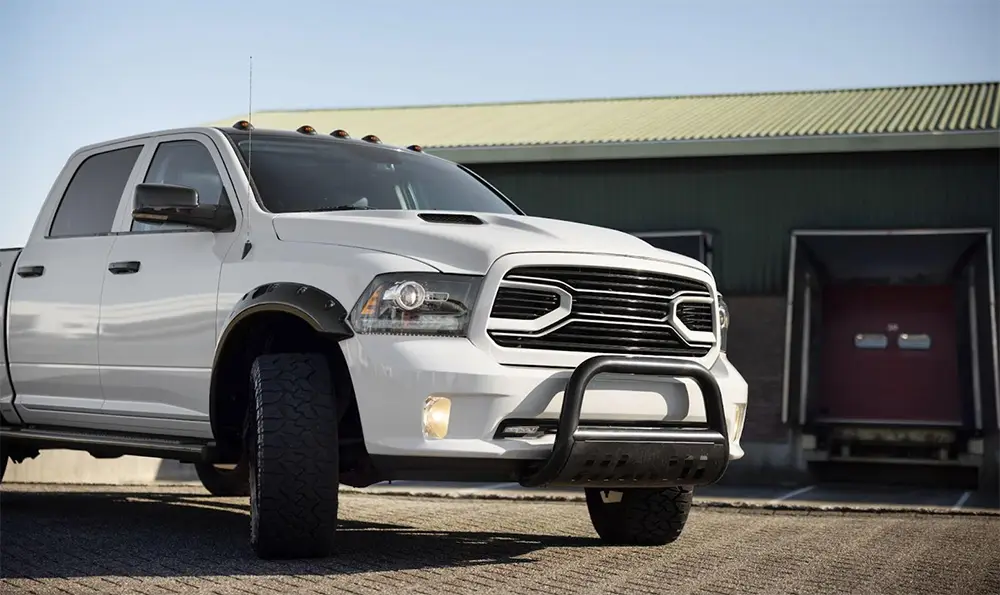 Motortopia Staff
.
April 06, 2025
.
Industry Updates
Motortopia Staff
.
April 06, 2025
.
Industry Updates

Truck owners often seek ways to enhance their vehicle’s performance, whether for off-roading, towing heavy loads, or simply improving overall driving experience. Increasing power is a common goal, and with advancements in automotive technology, there are many modifications and upgrades available. However, while many truck owners are quick to make changes to boost their truck’s power, there are some important aspects they often overlook.
In this post, we’ll explore what most truck owners miss when trying to boost power, and provide insight into the often-neglected areas that can make a significant difference. From improving engine efficiency to tuning the truck’s performance, here’s a breakdown of key considerations that can help you get the most out of your vehicle.
Many truck owners are familiar with performance upgrades like cold air intakes, turbochargers, and exhaust systems. These parts can definitely add horsepower, but the true potential of your truck’s engine is unlocked through proper engine tuning.
Truck tuning is one of the most overlooked modifications when trying to boost power. Without tuning, your truck’s engine may not be optimized to work with the new components you’ve added. Whether it’s improving air-to-fuel ratios, adjusting ignition timing, or calibrating the throttle response, tuning ensures that every part of your truck is working together for optimal performance.
For example, using an F150 tuner is crucial to ensure that your truck’s powertrain is optimized to handle its full potential. Tuning allows for precise modifications that help your vehicle perform at its peak and maximize fuel efficiency. A custom tune from an F150 tuner can make your truck run smoother, improve fuel usage, and unlock additional horsepower that might not be noticeable with hardware upgrades alone. This ensures your truck is not only more powerful but also operates more efficiently.
Upgrading the engine or adding a performance exhaust might seem like the go-to solution when trying to boost power, but the fuel system is equally important, and it’s often overlooked. A truck’s fuel system—consisting of the fuel pump, fuel injectors, and fuel filter—plays a key role in engine performance.
For higher horsepower, you need a consistent and efficient flow of fuel to the engine. If your fuel system is outdated or doesn’t meet the demands of your new performance parts, your truck will struggle to make the most of the upgrades. Upgrading to a high-flow fuel pump, larger injectors, or a better fuel filter can support the increased fuel requirements that come with boosting power.
Additionally, truck owners should consider adding fuel management software as part of a comprehensive tuning strategy. This software optimizes fuel injection rates and ensures that the right amount of fuel is being delivered to the engine, especially when additional power is being demanded.
One of the most important factors that truck owners often neglect when boosting power is the cooling system. Increased power output means increased heat generation, and if the engine or components are running too hot, performance can drop significantly, leading to premature wear and potential engine damage.
Upgrading your truck’s cooling system is essential for maintaining optimal engine temperature during high-performance driving. This may include upgrading to a more efficient radiator, adding an intercooler if you’ve installed a turbo or supercharger, or even installing better coolant hoses. A high-performance cooling system ensures that your truck can handle the extra power without risking overheating.
Additionally, a cooler engine runs more efficiently, which can help maintain consistent power delivery over long drives or during heavy towing.
Many truck owners focus on upgrading the intake system to increase airflow into the engine, but they overlook the importance of optimizing the exhaust system. An upgraded exhaust system, particularly a performance exhaust, allows the engine to expel exhaust gases more efficiently. This reduces backpressure, which can improve overall engine performance and increase horsepower.
A high-performance exhaust system typically includes a larger diameter exhaust pipe, high-flow catalytic converters, and a performance muffler. These modifications help your truck’s engine breathe more freely, boosting power output, especially at higher RPMs.
Furthermore, when combined with a proper tune, a new exhaust system can unlock even more horsepower, as the truck can expel gases faster and more efficiently, creating space for more air and fuel in the combustion chamber.
While suspension upgrades and new tires aren’t directly related to boosting engine power, they play a huge role in how your truck performs, especially when it comes to off-roading or towing heavy loads. Many truck owners overlook the importance of suspension when aiming to increase power, but a better suspension system ensures that your truck maintains control, stability, and proper handling when pushing its power to the limit.
If your truck is lifting or towing heavier loads, you’ll need a suspension system that can handle the additional stress. Upgrading to performance shocks or struts can improve ride quality, while adding a suspension lift can provide better clearance for larger tires. Speaking of tires, upgrading to a set of tires that match your truck’s performance upgrades is essential. Wider tires with better traction can help transfer more power to the road or trail.
The air intake system is often one of the first upgrades truck owners consider when boosting power. A cold air intake allows cooler, denser air to enter the engine, resulting in more efficient combustion and increased horsepower. However, not all air intakes are created equal, and it’s important to ensure that your intake system is designed to support the increased airflow required for your truck’s performance upgrades.
Upgrading to a larger, higher-flow air filter can help ensure your engine receives an ample supply of air, particularly if you’ve added forced induction components such as a supercharger or turbocharger. Keep in mind that installing a cold air intake can result in a louder engine sound, which may be a plus for some, but it’s something to consider before making the change.
When boosting power, many truck owners focus primarily on the engine and its components but overlook the importance of the transmission. Your truck’s transmission is responsible for transferring power from the engine to the wheels, and if the transmission isn’t up to par, all the power you’ve gained will go to waste.
Consider upgrading your truck’s transmission with a performance clutch, torque converter, or gears that can handle higher horsepower and torque. Additionally, tuning the transmission to better handle the power output will make a significant difference. Transmission tuning allows for smoother shifting, faster response times, and better overall driving performance, ensuring that your truck’s newfound power is fully utilized.
It’s easy to overlook, but reducing the weight of your truck can significantly improve its power-to-weight ratio, making your vehicle faster and more responsive. By removing unnecessary weight, such as heavy stock parts or aftermarket accessories, you make it easier for the engine to move the vehicle, giving the appearance of more power without touching the engine itself.
Lightweight components, such as carbon fiber parts, aluminum body panels, or lightweight wheels, can reduce the overall weight of your truck. This, in turn, improves acceleration and handling, allowing the engine’s power to go farther.
Even with all the performance upgrades, regular maintenance remains one of the most crucial factors in keeping your truck running at its best. Ensuring that your engine is well-maintained, your fluids are clean, and your parts are functioning properly will help your truck handle the increased power you’ve added.
Make sure to monitor things like spark plugs, belts, and hoses regularly, as well as keep an eye on exhaust leaks, oil levels, and tire pressures. Maintaining a clean engine bay, addressing potential issues before they become major problems, and staying on top of your truck’s routine maintenance will help preserve the power gains you’ve worked hard to achieve.
Boosting your truck’s power is an exciting process that can transform your driving experience, whether you’re looking to enhance performance for towing, off-roading, or simply enjoying more power on the road. However, achieving the best results requires more than just adding aftermarket parts or upgrading the engine. Truck owners often overlook key components such as tuning, the fuel system, cooling, and even suspension, all of which play a significant role in improving power output.
By focusing on these areas and ensuring that every part of your truck is optimized, you’ll get the most out of your performance upgrades and enjoy a truck that not only delivers more power but also runs smoothly and efficiently for years to come.
We use cookies to enhance your browsing experience, serve personalized ads or content, and analyze our traffic. By clicking "Accept All", you consent to our use of cookies. Visit our Cookie Policy for more info.
Notifications
Share Link